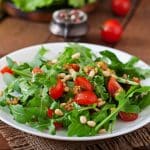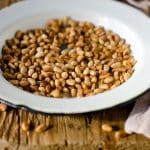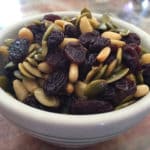Pine Nut Facts:

Nutrition Facts
Serving Size 1/2 Cup
Servings Per Container 1
Amount Per Serving
Calories 455
Calories from Fat 414
% Daily Value*
Total Fat 46g
71%
Saturated Fat 4g
20%
Trans Fat 0g
Cholesterol 0mg
0%
Sodium 2mg
0%
Total Carbohydrate 9g
3%
Dietary Fiber 3g
12%
Sugars 3g
Protein 9g
Vitamin A
1%
Vitamin C
1%
Calcium
1%
Iron
21%
Vitamin E
34%
Vitamin K
46%
Thiamin
17%
Riboflavin
9%
Niacin
15%
Vitamin B6
3%
Folate
6%
Pantothenic Acid
2%
Magnesium
297%
Phosphorus
39%
Potassium
12%
Zinc
29%
Copper
45%
Selenium
1%
*Percent Daily Values are based on a 2,000 calorie diet. Your daily values may be higher or lower depending on your calorie needs.
PQ (Protein Quality) x PDCAAS (Protein Digestibility Corrected Amino Acid Score) - 40
Additional Contents
- lutein
- zeaxanthin
- phytosterols
- beta-carotene
- pinolenic acid
- omega-6 fatty acid
- polyunsaturated fat
- monounsaturated fat
- essential amino acids
- complex carbohydrates
Potential Health Benefits
- powerful cardiovascular system health boost
- powerful bone & joint health boost
- slowing of eye macular degeneration
- lower cardiovascular disease risk
- cholesterol lowering properties
- connective tissue health boost
- promote anti-aging protection
- skin & hair health boost
- anti-cancer properties
- promote weight-loss
- energy boost
- antioxidant
Potential Athletic Benefits
- High source of fat for sustained long-term energy demands and weight-loss.
- Enhance pre and post-workout caloric intake for greater workout potential.
- Post-workout refueling source that includes necessary nutrients for muscle rebuilding and growth.
Glycemic Index Rank
<15 out of 100
| Rank | Value |
|---|---|
| Low Glycemic | less than 55 |
Food Sensitivity Rank
1 to 1 ratio*
| Rank | Value |
|---|---|
| Low for Fructose Sensitivity | less than or equal to 1 (fructose to glucose ratio) |
Pine nuts contain one of the highest amounts of fatty acids in all of nature. In addition, they contain essential amino acids, protein, complex carbohydrates, antioxidants, and phytochemicals. Pine nuts are a great additive to most any individuals diet plan. They go well on salads and in smoothies, and are also very calorie dense. Pine nuts can be eaten regularly but only in moderation to fat intake.
- The Effect of Pine Nuts on Appetite Sensations and Gut Hormones
- Phytosterol Content and Fatty Acid Pattern of Ten Different Nut Types
- Nuts Contain Bioactive Constituents That Elicit Cardio-Protective Effects
- Effects of Traditional Stir-Frying Process on Antioxidant Capacities of Pine Nut Kernels
- Review of Nut Phytochemicals, Fat-Soluble Bioactives, Antioxidant Components, and Health Effects

647kcal/serving

190kcal/serving

pinolenic acid
is a naturally formulated fatty acid found abundantly in pine nuts. Pinolenic acid has the potential to promote effective weight-loss by influencing appetite controlling hormones within the body and may also help lower LDL cholesterol by enhancing LDL metabolic uptake.
Sources include: USDA
***All-Body Fitness takes no responsibility for the accuracy of the information provided above. Please contact a medical doctor or a registered dietitian for nutrition advice.


